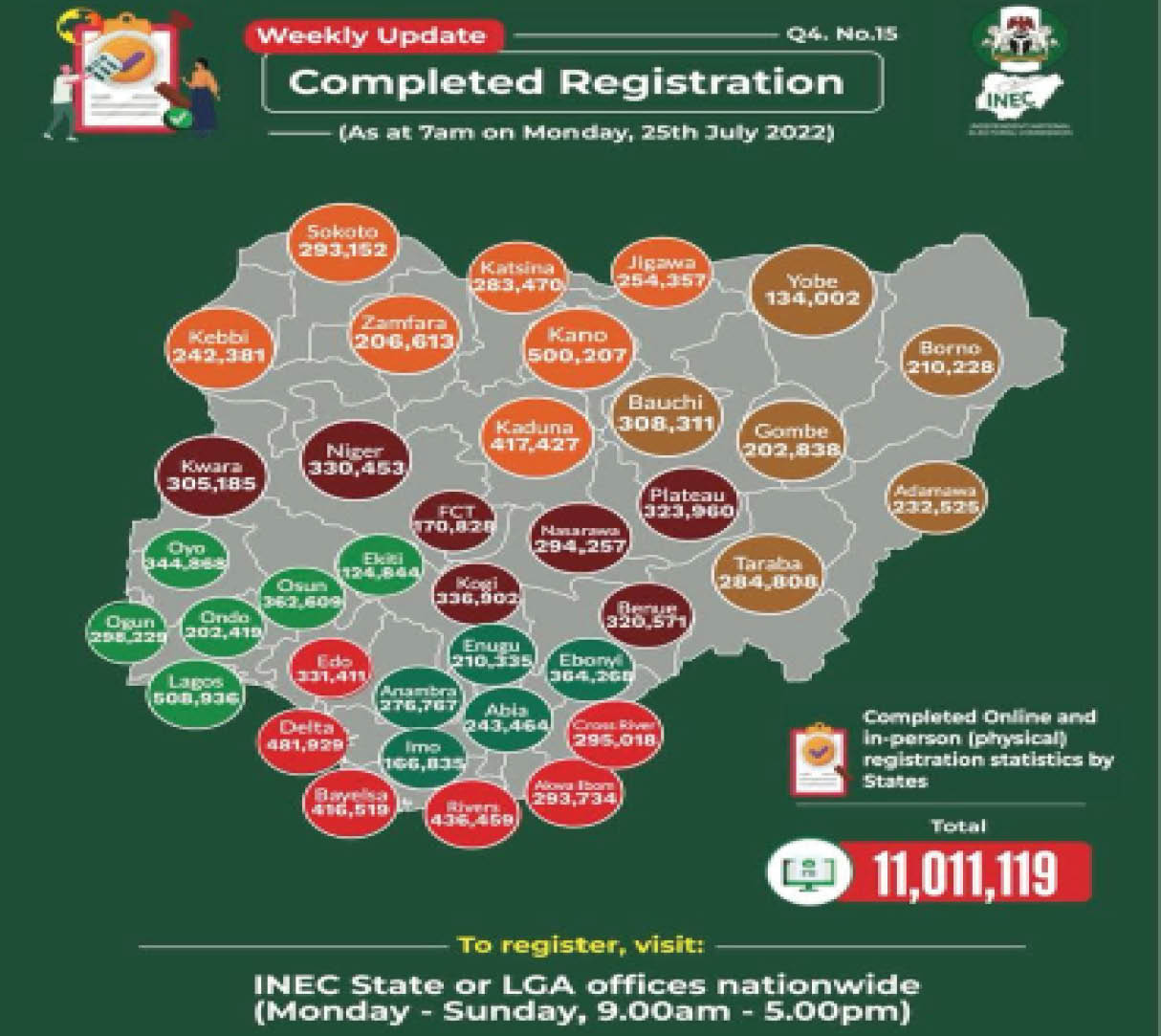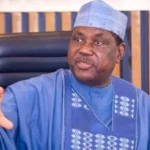With four days to the deadline of the Continuous Voters Registration (CVR) ahead of the 2023 general elections, majority of eligible voters from northern states appear lethargic about the exercise as official figures show.
Commensurate with their population, more northern states performed poorer than their southern counterparts in the latest figures analysed by Daily Trust, even as observers attribute the low numbers to insecurity and disenchantment by the voting population.
- NIGERIA DAILY: Reasons Why Voters Registration Will Not Be Extended Despite Anxiety
- NBS to collate data of students in public primary schools
Chairman of the Independent National Electoral Commission (INEC), Prof. Mahmood Yakubu, flagged-off the resumption of the online CVR, on 28th June 2021, to update the voters’ register after the 2019 general elections.
The INEC register for the 2019 general elections had 84,004,084 voters. Breakdown of the register showed the North West had the highest number of registered voters at 20,158,100 or 24 per cent of the total registered voters.
The South West came second with 16,292,212 registered voters or 19.39 per cent, while the North Central had 13,366,070 registered voters or 15.91 per cent and the South South registered 12,841,279 or 15.29 per cent of the total.

The North East and the South East regions come last with the total number of 11,289,293 or 13.44 per cent and 10,057,130 voters or 11.97 per cent, respectively.
INEC had extended the initial June 30 deadline for the ongoing exercise by four weeks to end on July 31.
Some states have, at various times, declared work free days to enable workers to obtain the voter’s card.
Also, many churches had variously mandated their congregants to participate in the exercise with some of them barring members without voter’s cards.
How the states stand
According to INEC in its CVR Update Quarter 4, Week 15 as at 7am, Monday 25th July, 11,011,119 registered to obtain the voter’s card.
Out of the total, 7,619,179 had completed physical registration while 3,391,940 had done online registration.
Details of the completed registration show that Lagos leads other states with 508,936 registrants followed by Kano, Delta, Rivers, Kaduna and Bayelsa states.
Though Kano with its 14,253,549 people, according to the 2020 Demographic Statistics Bulletin of the National Bureau of Statistics (NBS), is ahead of Lagos, whose population stood at 12,772,884, the state lags behind Lagos with over 8,000 voters, according to the INEC’s data. The completed registration for the state stood at 500,207 by Monday morning.
Delta, which stands third on the INEC chart, registered 481,929 new voters, in spite of its total population standing at 5,307,543, according to the NBS. The state recorded figures higher than many northern states with more population.
Katsina, with 9,300,382 people, according to NBS, recorded only 283,470 completed registration. Niger, whose population was projected at 6,220,617, registered 330,453 while Sokoto, with 5,863,187 people had 293,152 completed registration.
Kaduna, with 8,324,285 lagged behind Rivers, which registered 436,459 voters from its 7,034,973 people, as against Kaduna’s 417,427 new registrants.
Bayelsa, with a population standing at 2,394,725, registered 416,519 voters, way above Plateau (323,960 out of 4,400,974), Sokoto (293,152 out of 5,863,187) and Adamawa (232,525 out of 4,536,948). States with the least number of completed registration were Imo (166,835), Yobe (134,002) and Ekiti (124,844).
For online registration, Osun leads with 708,968, followed by Delta (641,765), Lagos (640,560), Kaduna (574,804) and Bayelsa (550,208).
Kano recorded 369,587; Katsina, 119,137 and Kebbi, 81,082. Yobe, Enugu and Imo were on the bottom with 91,239, 72,167 and 71,180 online registrants, respectively.
Why northerners are disinterested in CVR – Fage
Reacting, a political analyst and professor of political science at Bayero University, Kano (BUK), Kamilu Sani Fage, said two reasons are basically responsible for the seeming disinterest among the northern populace regarding the CVR exercise.
He said the first was not unconnected to the disappointment of the people with the performance of the government, which made many believe that registering to vote will make little or no difference, especially looking at the crop of leaders presenting themselves to take over from President Muhammadu Buhari in 2023.
The second reason, according to him, was inadequate mobilisation by politicians and political parties, noting that if not for the efforts of INEC, media and some elites, the turnout would have been worse than what was being recorded.
He stressed that it was unfortunate that politicians and political parties who stand to benefit the most from higher voter registration were busy with who gets what and when of the internal political wrangling and left the role of mobilisation unattended to.
Fage feared that there will be a very high voter apathy during the 2023 election if nothing is done to mobilise and sensitise the electorate, saying the country is likely to witness what is called “voter’s protest” whereby even those that have the means to vote will choose not to vote to protest against the failure of the government and lack of faith in the options before them at the polls.
Low turnout signs of disenchantment, mistrust – CSOs
Speaking on the development, the Chairman, Transition Monitoring Group (TMG) and Executive Director, Civil Society Legislative Advocacy Centre (CISLAC), Auwal Musa Rafsanjani, said the low turnout by Nigerians particularly in the northern region of the country is worrisome.
“This, I believe will have a great implication in the way and manner in which elections will be conducted in Nigeria if say the trend does not change before the closure of the voter registration process,” he said.
He also attributed the failure of many Nigerians and especially those in the North to come out and register in the CVR to poverty, insecurity and failure of governance among others.
He said, “Most Nigerians have given up on the current Buhari led administration as they consider it a total failure because of the events happening everywhere ranging from Kidnapping, massive poverty and unemployment and high level of corruption. This is a huge disappointment in the eyes of Nigerians with particular reference to the northerners, especially considering the fact that the president hails from the region.
“Democracy ensures that the voice of every citizen count, hence the provisions in the rule of law for leaders to always operate within the purview of what the law provides. The rampant breaking of the law by the very people who claim to be lawmakers and policymakers and implementers is another factor that is hindering Nigerians from coming out for the CVR.
On way forward, Rafsanjani said, “The very first and most important thing that the government and all relevant stakeholders must do is to ensure that before the 2023 general elections, all the aggrieved Nigerians are addressed in a way that restores their confidence and trust in the government.
“It all boils down to a gap in communication, people are fed up with lies and deception being told by leaders who always fail to keep up to their expectations and as such they become indignant.
“Another important thing to do is to assure the people that when they do their CVR and eventually cast their votes, it is the people they voted for that will be in office because as stated earlier, most people have lost faith that even if they register and vote, it will be to no avail because the people whom they voted for might not be the ones who will lead them.
“Equally important is the issue of the rampant insecurity that bedeviled the country. The government and all relevant stakeholders must work to ensure that people are guaranteed adequate safety and protection before, during and after elections as election security is of paramount importance because many voters even when registered are afraid to come out and cast their votes.”
On her part, the Director Centre for Democracy and Development (CDD), Idayat Hassan, said the internal displacement of citizens in some states, especially in the North West may have contributed to the low registration numbers.
She said, “Lack of voter education and mobilisation by the politicians may also contribute. The next few remaining days should be utilised to mobilise people to register.”
Also, the Executive Director, Resource Centre for Human Rights and Civic Education (CHRICED), Dr. Ibrahim Zikirullahi, said that in the course of the various civic education activities we organised, many citizens expressed frustration and disenchantment about the failure of democracy to deliver on the most pressing issues facing them, particularly the high cost of living and the galloping inflation, which have made them poorer than the last time they voted.
According to him, other people mentioned the prolonged ASUU strike as a reason for their lack of interest in registering to vote.
He said, “On the whole, our independent assessment of the situation points to a disappointed, disenchanted and demoralised citizenry, which has no faith that voting again will lead to better outcomes with respect to the most pressing economic challenges they are experiencing.”
Also speaking, the spokesperson, Coalition of Northern Groups (CNG), Abdulazeez Suleiman, told Daily Trust that northern groups have been worried by indications that there is obvious low participation in the ongoing voter registration in the northern part of the country compared to other regions.
“The CNG is convinced that the low turnout of eligible people for the exercise is not unconnected to the huge disappointment being felt by northerners resulting from the failure by the administration of President Muhammadu Buhari to meet the incredible expectations he raised in the minds of the public in the buildup to the 2015 election.
“The North from where the APC and Buhari extracted the bulk of their winning votes in 2015 is today unfortunately the most estranged, dejected section of the country with communities abandoned to the mercy of insurgents, bandits and sundry criminal gangs who operate freely and with ease,” he said.
INEC insists on July 31 deadline
Speaking on the development, the INEC Resident Electoral Commissioner (REC) in FCT, Alhaji Yahaya Bello, said the deadline for the CVR exercise remains July 31.
He also warned that those who register more than once would not get their PVCs, as such registration remains invalid.
Bello said that all CVR activities except the collection of already printed PVCs would be suspended on Sunday, July 31 and that the commission increased the closing hours to 5pm daily including Saturdays and Sundays.
According to him, this was done to accommodate the reawaking of those who now realised that they need their PVCs at the last hour of the programme that has been ongoing for over a year.
By Abdulaziz Abdulaziz, Abbas Jimoh (Abuja) & Clement Oloyode (Kano)

 Join Daily Trust WhatsApp Community For Quick Access To News and Happenings Around You.
Join Daily Trust WhatsApp Community For Quick Access To News and Happenings Around You.


